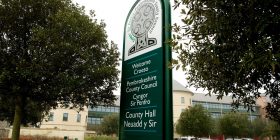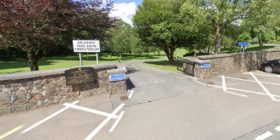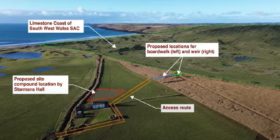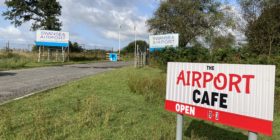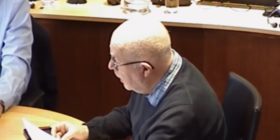Cardiff Met research project provides insights into heart health of chimpanzees

Research carried out by Cardiff Met has provided an insight into cardiac health and disease in chimpanzees, as well as highlighting cardiac similarities between humans and primates.
The International Primate Heart Project (IPHP) is a collaboration between veterinary practitioners, cardiac physiologists and cardiologists and was established in order to better understand why cardiac disease is such a major contributor to great ape deaths.
Limited detail is currently available on what is “normal” in relation to cardiac structure and function of primates, which is the primary focus addressed by research conducted by the IPHP. The project team, led by Cardiff Metropolitan University Professor Rob Shave, (Professor in Cardiovascular Physiology), has recently focused on ECG variables in a sample of 100 healthy wild born chimps (Pan troglodytes). An electrocardiogram (EKG or ECG) is a test that checks for heart problems related to the electrical activity of the heart.
Between 2009 and 2013, as part of routine health checks, ECGs were collected from chimpanzees at the Jane Goodall Institute’s (JGI) Tchimpounga Chimpanzee Rehabilitation Center, which is operated by the Jane Goodall Institute and rescues animals, often from the international commercial bushmeat and pet trades. The Cardiff Met team performs electrocardiograms whilst the primates are undergoing other essential medical assessments.
Dr Rebeca Atencia, executive director of JGI-Congo and Tchimpounga’s veterinarian and manager said: “JGI’s aim is to provide professional, high quality care for those chimpanzees unfortunate enough to be taken out of the wild and who may never have the opportunity to return. JGI’s mission is to ensure these animals have the opportunity to live out the rest of their lives in peace, without fear of harm and in as normal a social and environmental setting as JGI can provide for them, while ensuring the security and well-being of staff and of local human communities.”
Dr Atencia added: “Their healthcare needs are one of our priorities, thus working in partnership with institutions such as Cardiff Metropolitan University to understand and prevent heart disease in our chimpanzees is very important to us. Not only will such efforts improve the welfare of the individuals in our care and in captivity worldwide, but also help contribute to the survival of the species.”
These data have revealed that most animals had a cardiac rhythm similar to humans, but that using human criteria for cardiac enlargement many of the animals had evidence of LVH, or left ventricular hypertrophy, which signifies enlargement and/or thickening of the heart’s walls, or pumping chamber.
These data have enabled species-specific ECG reference ranges to be calculated which will now be used to help understand what causes cardiac problems in chimpanzees and to diagnose, prevent and treat chimpanzees at risk of developing heart disease.
Subtle differences in human and great ape ECG could also help to explain how the human heart may have evolved and why chimps and humans die from different types of heart disease.
Professor Shave said: “In very basic terms, we have been trying to determine what is normal for an ape heart. We want to collate a range of normal reference intervals for vets to access when they need to investigate heart health in these critically endangered animals. There are so many facets of comparative cardiology we are only just beginning to understand.”
Prof. Shave is supported by a research team including medical professional Aimee Drane, who manages the project at Cardiff Metropolitan University and has a clinical background in human cardiac ultrasound.
As part of their research, they have assisted the Jane Goodall Institute in the Republic of Congo in screening for heart disease in animals that are being rehabilitated. The Jane Goodall Institute hopes that one day these chimpanzees may return back to the wild, and ongoing understanding of their health is critical in seeing that process move forward.
Aimee Drane said: “Making sure that an animal is ‘heart healthy’ prior to re-introduction is really important as it is likely that re-introduction would be associated with increased levels of activity and exercise.”
Spotted something? Got a story? Email News@News.Wales







